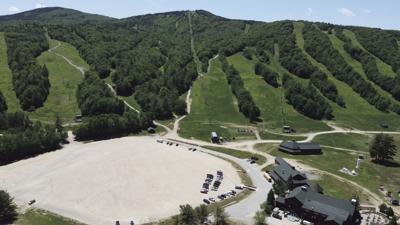GILFORD — Exactly one year ago, Gunstock Mountain Resort, without any senior management, was closed until further notice.
The 11 days until the management was reinstated broke the fever that had plagued the mountain’s management and the governing board for at least a year — and continues to rock local politics to this day. While mountain operations eventually settled back on track, the ordeal profoundly changed residents’ perception of the mountain as a political entity and their level of engagement with local politics.
The Daily Sun sat down with Gunstock Area Commission Chair and Vice Chair Doug Lambert and Jade Wood as well as general manager Tom Day to reflect on the last year and how their lessons from that period inform current mountain governance and management. The Gunstock Area Commission is the resort's governing board, established by state law in 1959.
“Everything is going well,” Day said, noting his excitement about the $6 million in capital expenditure projects — the renovation of two lodges, a repaving of the parking lot and the construction of a new, standalone building for rentals, to name a few — set for completion ahead of the winter season.
Despite these projects, one source of tension that remains unresolved is the fate of the resort’s master plan, a wish list of ambitious expansion still on pause from the early months of last year.
Staff, especially with those major projects ongoing, Day said, are focused on “getting everything here dialed in” before revisiting long-term planning. “We'll continue to talk about the master plan. But really the focus now is tuning things up here.”
Meanwhile, on the commission, “It's much more comfortable. Communication is easy,” Wood said. Especially with newly seated members, “there's a great synergy and a truly palpable feeling of support from all the commissioners for making the mountain successful.”
In the approximately six months since the commission’s last vacancies were filled, it has worked to develop a more thorough onboarding process and formalized written policies and procedures for the specifics of its work — a lack of which both Lambert and Wood noted in frustration last summer.
Day agreed the dynamic between management and the commission at meetings is “much more productive.”
“We present what we're doing, and everyone's supportive of what we're doing. There's always questions — you know, we’re spending $6 million in capital,” Day said. “But it's a normal discussion with normal people to talk about your normal business.”
It also has been a year of healing, for both commissioners and staff.
Day recalled the stress contentious commission meetings had put on management.
“I used to buy candy bars and give them to all the senior people and go, ‘OK, well, here's what you can have to get through the meeting. Take a piece of candy every time it gets worse.’”
It took time, after management’s reinstatement, he continued, for staff anxiety to be soothed.
“It really had a huge impact on everybody,” Day said. “It lingered, you know, like no one believed that it was going to be OK again.”
“We are all so excited to have begun to heal as a community,” Wood said. “We have come through a very, very challenging time, and we are very much looking forward to as a commission moving forward with an era of civility and in cooperation.”
When the GAC does return to future planning, the commissioners said, the new habits of openness with management will be a key asset.
Some past commissioners “kind of came into the commission with a vision or an idea of what they thought ought to be,” Lambert said. It is important the commission can listen to and embrace the vision of management for growth “instead of dictate from on-high down.”
“It is a wonderful thing to try to spitball and kick tires,” Wood added. “But you need to also be realistic and sensible and calibrate with the management team.”
Wood and Lambert, alongside new members Denise Conroy, Heidi Preuss and Terry Stewart, move forward with the vast majority of their five-year terms ahead of them, armed with the lessons of last summer’s “trial by fire.”
Lambert, especially, described what he learned about serving on local boards from the ordeal.
“I grew a lot in the last year in this role because I was ‘that guy,’” he said. “It’s no secret: I've been a bomb thrower and activist and everything.
“Perhaps I had fallen victim to some of what's in the air,” Lambert continued. “Coming into the job with an adversarial approach, it's easy to fall into that trap ... But one of the things that I learned is that rather than listening to some of the noise outside, it's a very basic human thing, where if you have a question, just ask. You don’t have to come in and pound a desk and demand an answer.”
Wood also emphasized it is not only important to ask questions, but to “listen to the answer.”
“Since my appointment I've been serving alongside some very, very strong personalities,” Wood said. “Priorities are exceptionally important. I think that if people can communicate with an air of respect, you realize many of our priorities are the same.”
The turmoil also brought out the strength of community voices and solidarity, Wood and Lambert said.
“Anybody who could think that they could deny the appreciation for this place from the community would have had a stark awakening,” Wood said, noting that both residents and the many teams and organizations who rely on the mountain were powerful voices in support of reopening.
The support, Lambert added, came to transcend past political fault lines. He still maintains cordial relationships with people on differing sides of the political spectrum, with whom he had previously “been at loggerheads.”
“It goes to show you the power of what this entity means to the community at large. That it can actually bridge some pretty, you know, wide divides,” Lambert said. “I know that maybe sounds a little corny, but it's real.
“It's interesting and crazy that a ski area or a mountain — a piece of property — can do that.”


















(0) comments
Welcome to the discussion.
Log In
Keep it Clean. Please avoid obscene, vulgar, lewd, racist or sexually-oriented language.
PLEASE TURN OFF YOUR CAPS LOCK.
Don't Threaten. Threats of harming another person will not be tolerated.
Be Truthful. Don't knowingly lie about anyone or anything.
Be Nice. No racism, sexism or any sort of -ism that is degrading to another person.
Be Proactive. Use the 'Report' link on each comment to let us know of abusive posts.
Share with Us. We'd love to hear eyewitness accounts, the history behind an article.